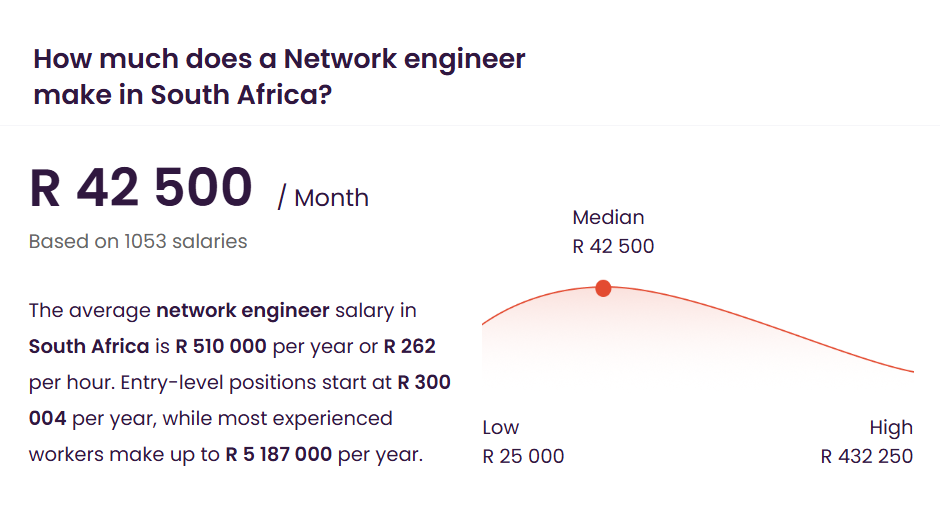Build the Backbone of Technology
OVERVIEW
Why Choose a Career as a Network Engineer?
- High Demand: Network expertise is needed across industries, from tech giants to government agencies, offering stability and opportunity.
- Shape the Future: Work with cutting-edge technologies like cloud networking and 5G, opening doors to advanced roles in cybersecurity or cloud engineering.
What Does a Network Engineer Do?
As a Network Engineer, you’ll:
- Design, configure, and maintain networks, including routers, switches, and firewalls.
- Optimize network performance for speed, security, and reliability.
- Use tools like Cisco Packet Tracer, Wireshark, or SolarWinds to monitor and manage infrastructure.
Average Network Engineer Salary in South Africa

Source: Talent.com

Grade 12 with Mathematics or Mathematical Literacy. Prior IT
knowledge or an entry-level
certification is recommended.
- IT Support Specialist
- Help Desk Technician
- Desktop Support
Technician - System Administrator
- IT Support Manager
Duration: 18 Months
Delivery Mode Mode: Online Self Paced
R43 500.00
Duration: 18 Months
Total Fees: R43 500.00
Deposit: R5 000.00
Balance After Deposit: R38 500.00
Monthly Installment (12 Months): R3 208.00
CERTIFICATIONS
EXAM CODE N10-008 & N10-009
CompTIA Network+ validates the core skills necessary to establish, maintain, troubleshoot and secure networks in any environment, preparing you for a rewarding career in networking and cybersecurity.
What Skills Will You Learn?
- Networking Concepts
Explain basic networking concepts, including the OSI model, network appliances, applications, cloud concepts, connectivity options and more. - Network Implementations
Understand routing technologies and important factors of physical installations; configure switching technologies and wireless devices. - Network Operations
Monitor and optimize networks to ensure business continuity. - Network Security
Understand security concepts and network attacks to harden networks against threats. - Network Troubleshooting
Explain the troubleshooting methodology and address common issues related to networking, including cable, connectivity, and software problems.
Validate your knowledge and skills in network fundamentals and access, IP connectivity, IP services, security fundamentals, and more. Take your IT career in any direction by earning a Cisco Certified Network Associate (CCNA) certification.
What You Will Learn:
- Networking Fundamentals
Master the basics of networking equipment, configurations, and troubleshooting techniques to ensure reliable network performance. - IP Services
Learn how to configure routing for various IP versions, understand redundancy protocols, and interpret routing tables. - Security Fundamentals
Gain foundational knowledge of cybersecurity, including threat identification and prevention, user awareness training, and secure access setup. - Automation
Explore how automation transforms network management. Learn to work with APIs and configuration tools, and understand the difference between traditional and controller-based networking.
The Cisco Certified Network Professional (CCNP) Security certification validates your ability to secure infrastructure at a professional level. From designing cloud security architecture to implementing secure network access and managing endpoints, CCNP Security prepares you for high-demand roles in the cybersecurity field.
What Skills Will You Learn?
- Security Concepts
Understand common threats and vulnerabilities, encryption fundamentals, VPNs, and core strategies for preventing cyberattacks. - Network Security
Compare and implement security solutions, configure firewalls, manage remote access, and deploy proactive network protection. - Securing the Cloud
Gain insight into different cloud models and services. Learn how to secure cloud applications and ensure compliance. - Content Security
Explore web traffic management, identity verification, and email security—including spam filtering and encryption tools.
